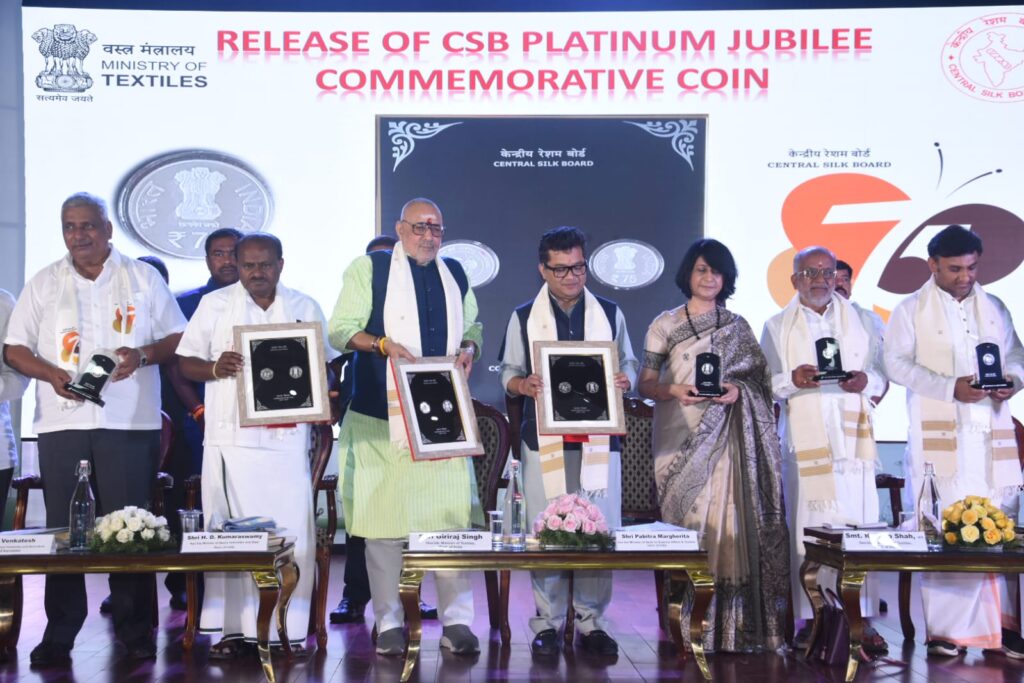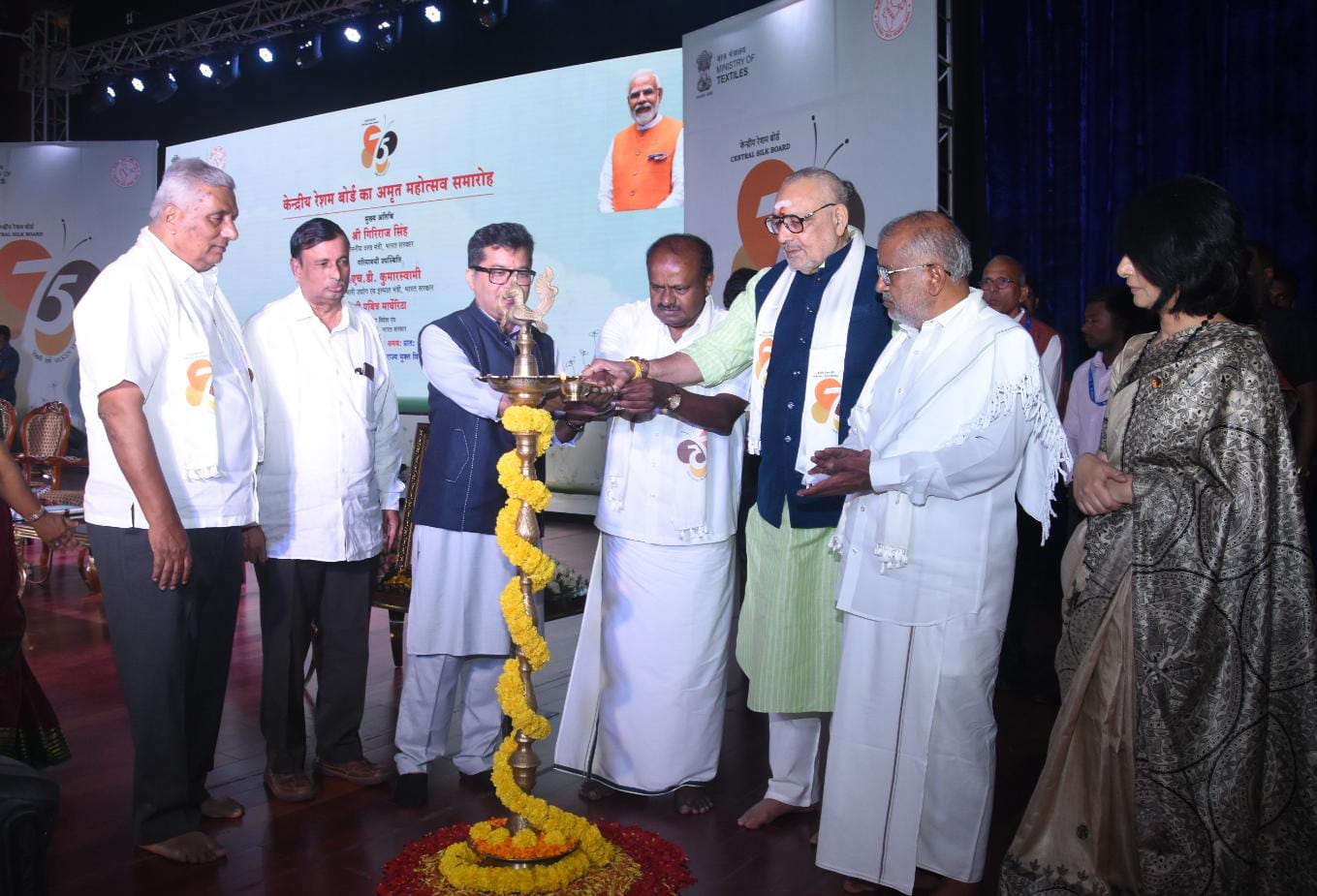New Delhi, Delhi, 25th of September, 2024 : Union Minister of Textiles, Shri Giriraj Singh unveiled the Commemoratory coin, celebrating the Platinum Jubilee of the Central Silk Board (CSB) at Mysuru on 20th Sep 2024. The Central Silk Board has proudly marked 75 years of dedicated service to advancing India’s silk industry.

The celebrations also witnessed the participation of many dignitaries including Union Minister of Heavy Industries and Steel, Shri H.D. Kumaraswamy; Minister of State for External Affairs and Minister of State for Textiles, Shri Pabitra Margherita; Secretary, Ministry of Textiles, Smt. Rachna Shah; Minister, Animal Husbandry and Sericulture, Govt. of Karnataka, Shri K. Venkatesh; Member of Parliament, Rajya Sabha and Board Member, Central Silk Board, Shri Iranna B Kalladi; Member of Parliament, Rajya Sabha, and Board Member, Central Silk Board, Shri Narayana Koragappa; Member of Parliament, Lok Sabha, Chikkaballapura, & Board Member, Central Silk Board, Dr. K. Sudhakar; Member of Parliament, Lok Sabha & Board Member, Central Silk Board, Shri A. G. Lakshminarayana Valmiki; Member of Parliament, Lok Sabha, Shri Yaduveer Krishnadatta Chamaraja Wadiyar; MLA, Govt. of Karnataka, Shri G.T. Devegowda; and other senior officers of the Ministry and Central Silk Board.
During the events commemorating the 75-year journey of the Central Silk Board (CSB), several significant releases and launches took place. A documentary video showcasing CSB’s history was unveiled, along with a commemorative coin celebrating the Platinum Jubilee and a Coffee Table Book titled CSB in the Service of the Nation Since 1949. A postal cover featuring the CSB 75 Years Logo was also released. Additionally, new mulberry varieties and silkworm hybrids, including CBC-01 (C-2038) for Eastern and Northeastern India, as well as CMB-01 (S8 x CSR16) and CMB-02 (TT21 x TT56), were launched to enhance silk production. Four new technologies—Nirmool, Seri-win, Mr. Pro, and a trapping machine—were introduced, alongside the release of 13 books, 3 manuals, and 1 Hindi magazine dedicated to sericulture. The Silk Mark India (SMOI) website was officially launched, and notable exchanges of Memoranda of Understanding (MoUs) occurred between CSB and prominent institutions like ICAR-CIFRI Barrackpore, Jain University Bengaluru, and Assam Agricultural University (AAU), Jorhat, to strengthen cooperative efforts in sericulture research and training.

The introduction of new mulberry varieties and silkworm hybrids is crucial for enhancing silk production, particularly in Eastern and Northeastern India, thereby diversifying production areas and reducing regional dependency. Additionally, the launch of innovative technologies like Nirmool and Seri-win addresses critical challenges such as pest management, promoting sustainable practices, and increasing productivity.
Educational resources released during the event will empower farmers with essential knowledge, while the signed MoUs with institutions like ICAR-CIFRI and Jain University facilitate collaborative research and training initiatives. This strategic approach to enhancing infrastructure, market access, and resource availability for sericulture farmers creates a supportive ecosystem for their growth, ultimately aiming to uplift livelihoods and strengthen India’s position in the global silk market.
The Seri-stakeholders experience-sharing session was also held during two days of celebrations, bringing together all stakeholders in the Silk sector and by-product producers. The session provided a platform for participants to interact and share their experiences regarding the current state of the silk industry. Several key suggestions emerged from the discussions, including the creation of a platform for utilizing sericulture waste in animal feed, pharmaceuticals, and medical applications.
Participants emphasized the need to strengthen market facilities in sericulture states and stabilize cocoon prices while reducing the influence of middlemen to increase farmers’ margins. They also called for subsidies on sericulture components, along with adjustments to unit costs in line with market inflation.
The Central Silk Board was set up based on the recommendations of the Silk Panel by the Imperial Govt. on 8th March 1945 to examine the development of silk industry, the Government of Independent India enacted the CSB Act 1948 on 20th September 1948. Accordingly, the Central Silk Board (CSB) a statutory body was set up under an Act of Parliament (LXI) of 1948 to shape the Sericulture Industry on 9th April 1949.
The Central Silk Board (CSB) is the sole organisation for comprehensive sericulture Research &Development (R&D) and coordinates development programs across 26 States/UTs. The mandated activities of CSB are Research and Development, maintenance of four tier silkworm seed production network, leadership role in commercial silkworm seed production, standardizing and instilling quality parameters in the various production processes, and advising the Government on all matters concerning sericulture and silk industry. These mandated activities of the Central Silk Board are being carried out by the 159 units of CSB located in different States.
CSB’s R&D institutes have played a pivotal role in developing over 51 silkworm hybrids tailored to different regions and seasons, 20 high-yielding varieties of host plants, and more than 68 patented technologies. Due to CSB’s R&D effort, the country has started manufacturing Indigenous Automatic Reeling Machines, which were earlier imported from China. These advancements have been instrumental in improving silk production, providing valuable tools and techniques for farmers and stakeholders to enhance both quality and yield.
Through the transformative initiatives of the Central Silk Board (CSB), India has made impressive progress in the silk industry. The nation now ranks as the second-largest silk producer worldwide, with its share of global production jumping from 6% in 1949 to 42% in 2023. Raw silk production has skyrocketed from 1,242 metric tonnes in 1949 to 38,913 metric tonnes in 2023-24. Efficiency improvements are evident, as renditta has decreased from 17 in 1949 to 6.47 in 2023-24, and productivity per hectare of mulberry plantations has risen from 15 kg to 110 kg. Furthermore, silk exports have experienced remarkable growth, with earnings increasing from ₹0.41 crores in 1949-50 to ₹2,028 crores in 2023-24 and reaching over 80 countries.










More Stories
Stakeholder Workshop On ‘Strengthening Camel Milk Value Chain In India’ Organized In Bikaner As Part Of International Year Of Camelids.
Union Health Minister Shri JP Nadda Holds Meeting With Chief Ministers On The 100-Day Intensified TB Elimination Campaign.
HMoJ Shri C.R. Patil, Inaugurates Climate Smart Agro-Textile Demonstration Center In Navsari, Gujarat.